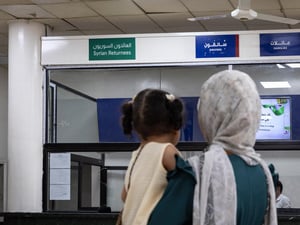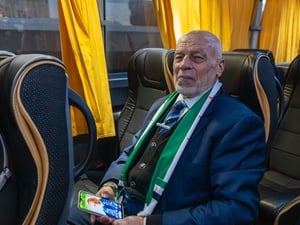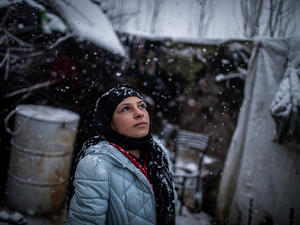Young Syrian refugees learn to sow for their supper
Young Syrian refugees learn to sow for their supper

Abdallah, 17, teaches a Syrian refugee girl how to plant crops during a gardening workshop at the Mazboud community center in Lebanon. Abdallah learned about growing flowers and vegetables from his grandfather when they lived in peace in Syria.
MAZBOUD, Lebanon, January 12 (UNHCR) - Seventeen-year-old Abdallah has had "green fingers" since he was a young child in Syria, where his grandfather taught him how to grow flowers and vegetables.
Today, the refugee is passing on his knowledge to other young Syrians at a community centre in the highlands of neighbouring Lebanon, where they found shelter with their families after fleeing the fighting that has torn their homeland apart. Abdallah's students also include youngsters from the local host community
"You have to dig a small hole in the ground and put the seedling in," Abdallah tells one of the children. "Then you cover the hole with some earth to protect it so it can grow," he adds while showing his young student how to do it.
It is a valuable lesson in how to become self-sufficient in a country where refugees have to rely a lot on their own wits. The vegetables that he grows will be eaten by the children cultivators and others who use the centre in the village of Mazboud, which is located in the Mount Lebanon range.
Abdallah also teaches the youngsters how to recycle empty bottles and other garbage into useful objects in the garden of the community centre, one of 14 set up in Lebanon by UNHCR - with support from the United Kingdom government - to help Syrian refugees and vulnerable local communities.
Winter has descended on the Mount Lebanon area, but when the weather is better the tranquil garden also provides somewhere for children to play or to receive counselling for trauma. It is also a place to find new friends and develop new interests. Adults come here to learn English or improve their Arabic. People can also learn new skills that could help them become self-sufficient, including agriculture, tailoring, hair dressing or cookery.
For Abdallah, the oldest of four children, it reminds him of happier times growing up in Damascus, two years after his family fled to Lebanon when the situation in the Syrian capital became too dangerous. He misses his friends.
His mother, a history teacher, has not been able to find work in Lebanon, but his carpenter father makes enough to meet the family's basic needs. After arriving in Lebanon, Abdallah says he was grateful to be safe, but he felt depressed.
Wanting to make a positive contribution to the community and to help improve the perception that some Lebanese have about Syrian refugees, he volunteered to work in the garden of the community centre. His mother says it has had a therapeutic effect and Abdallah has become more like his old self.
He has been encouraged by Firas, a Lebanese social worker hired by Intersos, the Italian NGO that manages the centre for UNHCR. "Firas is my friend," Abdallah says of a man who has engaged him in activities and helped him make the most of his situation, move forward and develop new passions and talents.
The community centre at Mazboud has helped many others, like Hassiba, who comes from Lebanon but spent half her life in Syria before fleeing and renting a room nearby. "Although I lost everything, the centre makes me and others see the good things in life again. This place brings peace to people," she says.
The centre, and others in the country supported by the British government, also provides people with important information on local services, including childcare and health care, as well as helping people improve their life skills and wage-earning ability. Social workers provide counselling and psychosocial support. All centres are open to refugees and members of host communities.
In the garden, meanwhile, Abdallah's face lights up as he spots old water bottles that the children have turned into flower pots and hung from a tree. His students are learning fast about recycling and protecting the environment. Slowly, he moves from one child to another to check on their work ¬- teaching them gives him confidence and satisfaction and hope.
Complimented by a UNHCR staff member on his creativity, Abdallah says: "Oh that's nothing, I can do much more."
By Karolin Eberle and Rafaella Vicentini in Mazboud, Lebanon








